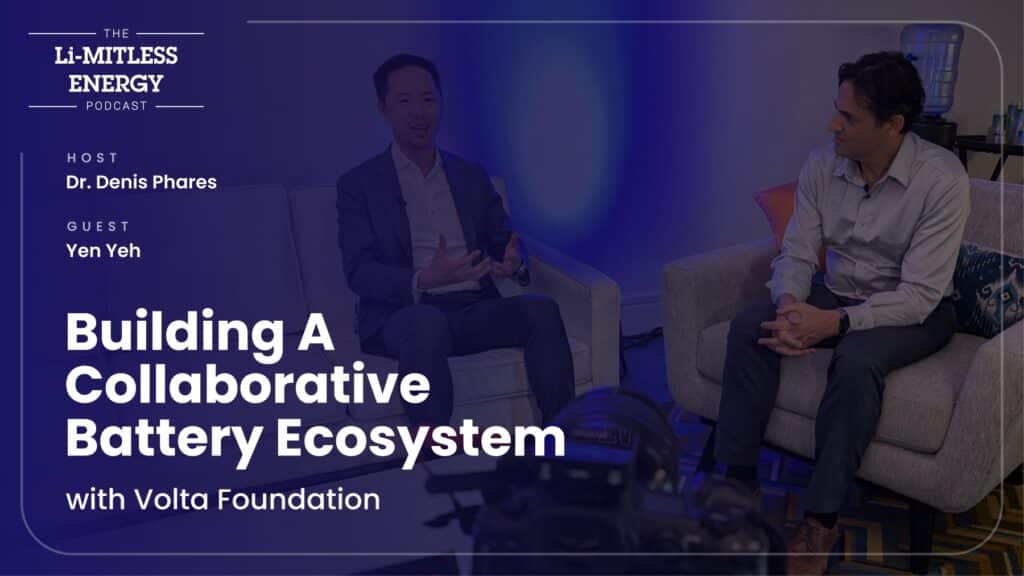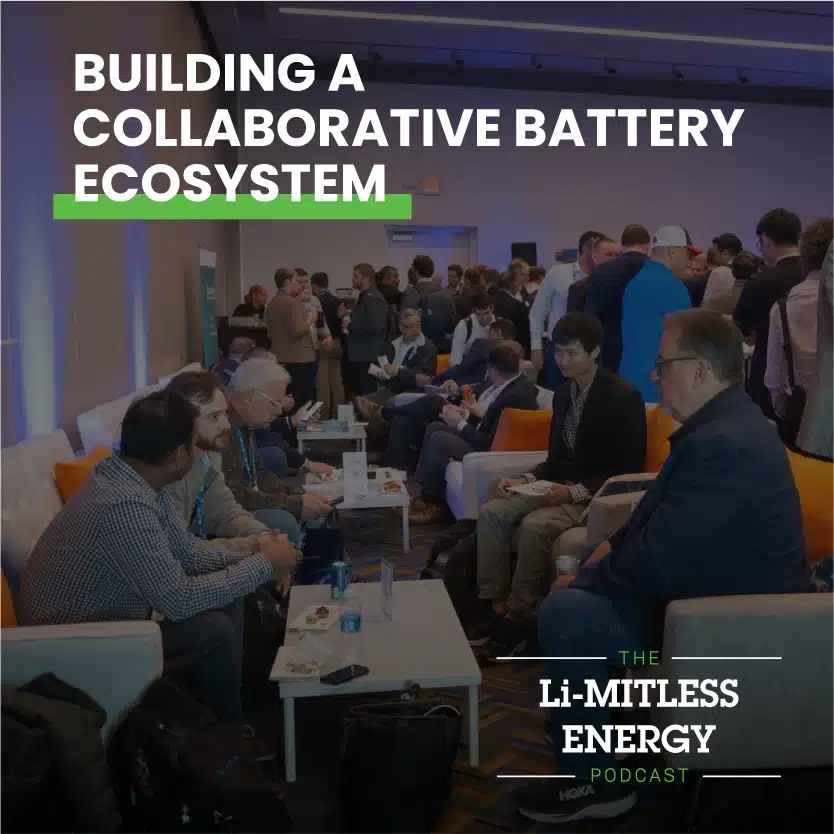Fostering collaboration across the global supply chain is crucial as the rapid growth of the battery industry continues. In this episode of the Li-MITLESS ENERGY Podcast, Yen Yeh, Executive Director of the Volta Foundation, sits down with host Dr. Denis Phares to discuss the foundation’s role in nurturing innovation and advocacy for more than 50,000 professionals and over 160 companies within the battery industry. Tune in as Yeh shares insights on workforce development, technology innovation, and the importance of breaking down silos to drive sustainable growth in the battery sector.
A Global Network for Battery Experts | How the Volta Foundation is Driving Industry Growth

Facilitating the world’s largest network of battery professionals, the Volta Foundation was created to accelerate the growth of the battery industry by empowering battery professionals at every stage of their careers. Made up of 50,000 members from over 160 member companies, the Volta Foundation fosters collaboration, innovation, and advocacy among its members by producing publications and offering networking opportunities and industry resources. By connecting battery professionals globally with key resources and collaboration opportunities, the Volta Foundation is leading the charge to grow this ever-evolving industry.
In this episode of the Li-MITLESS ENERGY podcast, Denis Phares interviews Yen Yeh, Executive Director of the Volta Foundation, during The Battery Show in Detroit. Yen explains how the Volta Foundation supports the rapidly expanding battery industry, serving 50,000 professionals and 180 corporate members across the supply chain. A battery scientist from MIT and part of the foundation’s founding team, Yen emphasizes the need for collaboration and infrastructure to address industry challenges, such as workforce shortages, cost reduction, and resource limitations, especially in lithium sourcing. The conversation highlights Volta’s initiatives, like virtual conferences, thought leadership events, and career fairs, which aim to promote industry growth, professional development, and potential certification programs in battery engineering.
Listen to the full episode on YouTube or wherever you stream podcasts, and follow along with the Volta Foundation’s latest networking opportunities and industry resources on LinkedIn.
Podcast Transcript
Denis Phares 0:11
Welcome to The Li-MITLESS ENERGY Podcast. We are here in Detroit, Michigan at The Battery Show in the Volta Foundation lounge. And I’m very pleased to welcome my next guest, Yen Yeh, Executive Director of the Volta Foundation. So, thank you for joining us, and thank you for letting us use your lounge.
Yen Yeh 0:30
Of course. Yeah. Thank you, happy to be here.
Denis Phares 0:33
Yes. So, let’s start off by talking about the Volta Foundation. Volta Foundation is an organization with a large number of members throughout the lithium battery industry. How did it get started and how did it grow so fast?
Yen Yeh 0:45
Yeah, thank you for the question. So, the Volta Foundation is a trade association for the battery industry. We’re quite unique in our setup. We have both professional members as well as corporate members. So, on the professional side, we have a community of about 50,000 battery professionals that are regularly engaging with our content, with our events, and so on. On the corporate side, we have today about 180 companies all throughout the battery supply chain. Companies that make batteries, use batteries, as well as suppliers into the supply chain that are a member company. So, our mission is to help support the growth of this quickly-growing industry. And so, that’s why we’re here, just providing the that platform.
Denis Phares 1:29
Yeah. Thanks for that background. How about you? What’s your background and how did you get involved? Are you a founder, or what’s your position?
Yen Yeh 1:37
Yeah, absolutely. So, today, I am the Executive Director at the Volta Foundation. I am part of the founding team. The Volta Foundation is a relatively new organization, we’re about five years old today. In terms of my own background, I’m a battery scientist by training. So, went to school at MIT, studied material science there. And then after that, made a career for myself in the battery industry, mostly on the R&D side of things, having worked at Apple, at Enovix, and different startups in the Bay Area commercializing different battery chemistries. So, like I mentioned about five years ago, some co-founders and I got together to start the Volta Foundation really to provide this strong network and platform to support the growth of the industry. I think all of us here can recognize that the battery industry is at this inflection point right now where, if you look back 10 years ago, I think the battery industry used to look more like a niche industry where, essentially, we were supplying components into the consumer electronics industry. But, if we look ahead, say, 10 years from now, I think the battery industry is on this inflection trajectory to become a major part of the global economy. So, a lot of things need to be developed to properly support this growth. So, that’s why the Volta Foundation is here, is to help the entire ecosystem figure out the path to sustainable growth.
Denis Phares 3:14
So, you went to MIT?
Yen Yeh 3:16
I did, yeah. I was very lucky. I’m sorry?
Denis Phares 3:19
Who did you work with?
Yen Yeh 3:20
So, I did a lot of research in Professor Sadoway’s group. So, that’s where I learned all my electrochemistry, and…
Denis Phares 3:29
So, he was doing the liquid metal?
Yen Yeh 3:31
That’s right. High temperature electrochemistry. Yeah, that’s right. Liquid metal batteries at the time.
Denis Phares 3:36
You know, I went to Caltech.
Yen Yeh 3:37
Oh, my goodness. Okay, so can we still be friends?
Denis Phares 3:41
I don’t know.
Yen Yeh 3:42
We’ll try.
Denis Phares 3:43
Yeah. So, the one story I have on the rivalry there, I was once sitting next to Tom Brokaw on an airplane because he had just given the commencement address at MIT, the next year he did the Caltech commencement address.
Yen Yeh 4:02
Oh, wow. He was the bridge between…
Denis Phares 3:04
Yeah. But he said when he spoke at MIT, he had to speak slowly and use small words.
Yen Yeh 4:09
I can see that. Yeah. Folks are pretty good at Caltech.
Denis Phares 4:12
Anyway, we’ll move beyond that.
Yen Yeh 4:16
Okay. We’ll try to…
Denis Phares 4:17
So, MIT certainly has quite a name in battery. So, certainly, there’s Professor Sadoway, and Yet-Ming, and there’s quite a few battery startups that have originated. So, what can you tell me about the startup environment in the United States generally spun out of these universities, as compared to the incredible growth that Asia demonstrated over the last decade?
Yen Yeh 4:44
Yeah. That’s a really good question about… It’s a question about ecosystem. And I think one of the advantages that the United States has is we have this wonderfully advanced R&D infrastructure and process from our national labs, all the way down to world leading universities, and then a great infrastructure for supporting, financing the growth of startup companies. And so, I think, in the last maybe 10 years, you can see a lot of growth in the battery industry, especially in the United States, being driven by all these wonderful startups. So, I think that’s certainly one of the advantages that we have compared to other places in the world. On the other hand, I think this might be interesting for your audience to hear, so I think about batteries every day of my life, but I imagine if somebody who is casually paying attention to the battery industry, it might be surprising to them to hear that if you make a list of the top 10 battery manufacturers in the world today, none of them are Americans, and that’s quite surprising. A lot more to say about that, but just an interesting tidbit.
Denis Phares 6:06
Yeah. We’re definitely playing catch-up in the United States. And so, I guess my question to you is, with all the technology that’s being developed through the national labs, the university system, all the startups that are being formed, can you bridge the gap from startup and get to the scale that Asia is already at, and can you do it in a way that you can actually compete on the world stage? You have an overarching view with all these companies that you are in contact, so do you see any trends, or, well, let me put it this way, do you see any hope?
Yen Yeh 6:44
That’s the question, isn’t it? I think so many things to say about this very large question. Personally, I’m quite biased. I’m American, and I believe in the capability of our scientists, and of our industrialists, of our financial system. So, I think there’s hope. So, there’s 20,000 people at The Battery Show today. If you do a poll, there is not a consensus about where the future of the battery industry will be located, whether it’s the United States, or in Asia, or maybe there’ll be distributions globally. So, that’s certainly an outstanding and hotly debated topic in the days. My personal opinion is history doesn’t make itself, it takes people like Dragonfly, like Volta Foundation, and all of us in the ecosystem working together, figuring out what is the best path forward. I think one thing that is dear to my heart is this concept of coordination and collaboration. The battery industry traditionally, for interesting historical reasons, having been coming up from the specialty chemicals roots tends to have a tradition of being very siloed, very proprietary. But as the industry grows, we’re facing all these tricky problems, things like workforce development, like policy advocacy, like educating the public about our technology. Things that all of us can benefit from if we work together more and find ways to coordinate and collaborate. So, that’s something that I think about every day at Volta Foundation, how do we get that to work?
Denis Phares 8:34
And that’s a great answer. And I agree with you. I have hope, and I do believe that a lot of it has to do with collaboration, and an organization like the Volta Foundation provides that national, and, to a certain extent, more global, but also national ecosystem where companies can become aware of what’s going on, what’s going on other company because it shouldn’t be siloed. Just look at the battery show here, every little part of the supply chain and of the manufacturing process has technology associated with it, and that’s evolving and being developed here. So, I think there is… I describe it as an incredible opportunity.
Yen Yeh 9:18
Yeah. Absolutely.This is an interesting topic. So, at the risk of spending too much time on this one topic, I will say, especially today, we think about the growth of the industry. So, every year, the battery industry grows about 30, 40% year on year, and what’s underpinning that growth is the continued improvement in cost for batteries. If you look back 10 years ago, when the Tesla Model S first came out, battery cell price was about $1,000 per kilowatt hour. Today, you can find sort of spot prices for sales around $100 per kilowatt hour. So, just in 10 years, I think we have a 10-fold improvement in price. And that will continue to happen, and they’ll continue to drive adoption, and new applications will come out of it. So, the question about what is the future of the battery industry, one part of it is costs and cost improvement, and usually there’s not enough time to talk about what’s driving the cost improvement. I think from the perspective of, say, very large scale manufacturers, economy of scale drives cost improvements. But from the perspective of innovative companies like Dragonfly, it’s also leading-edge technologies, next-generation materials, and processing capabilities that is going to kind of lead to further improvements in price, and adoption, and performance of batteries. So, I think there are things that maybe we don’t have as much large-scale manufacturing in the United States, and I think we have other advantages that we can leverage to compete as well. So, yeah, I have hope, I guess, is the summary of it.
Denis Phares 11:08
I think you’re right. In the short term, the prices continue to decrease, both because of economies of scale. More recently, there’s been a lot of lithium available. So, what happens in the medium to long term when demand grows so much? Let’s say these 2030 goals are somehow approached that everybody could be driving an electric vehicle., but there is a limiting rate that we can get lithium out of the ground. Even if there’s lithium available, just getting it out of the ground fast enough and processing it, isn’t that going to drive up the cost at the same time?
Yen Yeh 11:44
Yeah. Oh my goodness, the price of lithium is such a tricky topic. I’m not a lithium pricing expert, but you’re right. There is a lot of lithium on Earth, but mining it, there’s quite a bit of a lead time in building up the mines, and getting it extracted, and so on. Yeah, that’s a very good question. Two points I’ll make about that. One is there is a lot of lithium in the United States, and there are many, many companies that are working on not just developing the mines, but also developing new technologies to extract the lithium from the ore or from the brine. So, in the long term, I’m optimistic about having enough lithium to supply the world. In longer term, there are thoughts around recycling and kind of getting lithium out at the end of life. But it’s a hot commodity. There’s a lot of volatility in the pricing of lithium just in the last couple of years. So yeah, really interesting topic for all of your listeners to pay attention to is the price of lithium, supply, and demand. Yeah, really interesting topic.
Denis Phares 13:03
It’s something we obviously think about a lot. And coming from the state of Nevada where there is a lot of lithium that is going to be imminently mined, it’s been a big topic in the state that has also been driven by the state officials. And there’s obviously a push to be able to maintain the revenue in the state, rather than just getting out of the ground and ship it away. So, there’s a whole infrastructure that needs to be developed, not just the talent and the know-how, but the infrastructure. Just being able to take material from a mine and drive it somewhere and transport it. So, I think, from a technical standpoint, how does the Volta Foundation really help in bolstering the overall infrastructure that needs to be rapidly developed?
Yen Yeh 13:58
Yeah. So many things to say about that. Your questions center around this particular part of the battery supply chain. I think one of the things that we think about is a little bit higher level. So, for example, one topic is thought leadership. So, even just for lithium extraction, there’s many technologies on the table for further development. One of the things that we do to contribute to that conversation is we have a large number of events, publications, and other resources that our member companies leverage for thought leadership. So, for example, we have more than 50 events, both virtual and in-person, that we organize every year. One example of an event is one called The Battery Forum. It’s our monthly virtual conference. Every month, more than a thousand people RSVP to join this virtual conference, and about seven to eight different companies will come and give presentations in these very interactive breakout rooms. And so, one of the things that we can do as a service for the industry is to provide those platforms for people to communicate and coordinate and kind of learn about what’s happening in the ecosystem. So, I think just bringing that level of awareness, democratizing that sense of knowledge and networking is the first step in getting everybody on the same page. I’m not sure if I answered your question, but I think from where I sit, just helping the ecosystem develop a stronger understanding of where we need to be is one of the things that we think a lot about.
Denis Phares 15:46
Yeah. No, that is a great answer, actually. And the foundation, I’ll say it again, it really does play a very important role in the future success of this industry, especially here domestically. So when you and your co-founders were sitting around and thinking about what needed to be done, has it evolved into what you thought?
Yen Yeh 16:09
Yeah. Absolutely. When we think about an ecosystem, what does a healthy ecosystem need? There’s so many functions that are critical to the health of an industry that, frankly, don’t make a lot of money or don’t make you famous. And so, that’s typically where nonprofits come in to perform those critical functions. Things like community building, generating reports and resources. For example, we host a very large career fair twice a year. So, about a month ago we hosted the most recent one, more than 2000 battery professionals RSVP to come to this career fair here from more than 20 leading companies in the battery industry, and hopefully, a lot of them are getting jobs now. It was just a month ago, so we don’t have the data from that event, but it’s things like that we provide to the ecosystem. Things like workforce development, education, policy advocacy, coordinating different companies’ activities.
Denis Phares 17:16
Yeah. Great. So, I recently spoke with the Strativ in terms of talent and workforce development, and one of the interesting things that they said was the need to train, to actually train the workforce even at the recruiting forum. Is there anything with the foundation that can be done to enhance the technical training or, I guess, trying to disseminate some of the important fundamental knowledge that has to be known by the workforce? Is there anything that Volta is doing in that regard?
Yen Yeh 18:03
Oh, man, there’s so many things that needs to be done. On the very basic level, one of the studies that Volta has done for the last two and three years is to look at the salary trend in the battery industry. How much are companies paying for the talent, for battery engineering talents? And what we found is that over the last five years, battery industry salary has skyrocketed 40% after adjusting for inflation. And what that’s saying is that there is just a dramatic shortage in talent in the battery industry. So, the question is, how do we address that shortage? I think, even today, a lot of the times when I hear from our member companies is talent just kind of goes from one company to another, and that’s why recruitment is needed.
Denis Phares 18:55
Which is common in any industry.
Yen Yeh 18:56
It’s common in any industry. On the ecosystem level, might be zero-sum, might be slightly positive. So, where we come in is thinking about ways of helping professionals from other industries with translatable skills transition into the battery industry. That’s part of the reasons why we host the battery career fair, is to just provide divisibility for battery companies, for more people that are interested in joining us. Longer term, I think your listeners might be very surprised to hear that there really isn’t a certification program for battery engineering, which is kind of crazy. If you want to cut hair, you need to get a certificate. But if you want to make batteries, like, no, you just got to learn a job. And so, longer term, I think there’s a lot of conversations, both locally in California, but also kind of more globally, sorry, more nationally, about to enable the battery workforce challenge and so on, to develop programs like that in a more systematic way to encourage students to get into the industry, and a way to sort of be trained and recognized with that training.
Denis Phares 20:10
Great. Well, I will say, as a member of the Volta Foundation, we thank you for the work that you’re doing and what you’re doing for the industry.
Yen Yeh 20:19
Yeah, thank you. And there’s a key role for member companies to play in this process. Certification programs don’t tend to work very well if they’re not recognized by industry companies, and so a lot of the work that we are doing is getting feedback from our member companies and making sure that the certification, the training that’s developed, reflects what’s actually needed in the industry.
Denis Phares 20:42
Sure, there’s no doubt. You…
Yen Yeh 20:43
You guys are the experts.
Denis Phares 20:44
You have to be told what’s needed. Absolutely, and happy to have that two-way straight on our ends. Well, Yen, thank you so much for being on the podcast.
Yen Yeh 20:54
Thank you.
Denis Phares 20:55
For letting us use your lounge.
Yen Yeh 20:56
Thank you. Very welcome. And, yeah, happy to be here. To learn more about the Volta Foundation, please check us out on our website, volta.foundation.
Denis Phares 21:05
Thank you for listening to The Li-MITLESS ENERGY Podcast. Be sure to subscribe on any of your favorite podcast platforms.
[End Of Recording]


